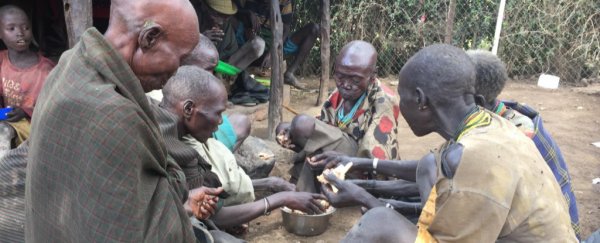The Ik people of Uganda are a small mountain community with a big reputation. Except there are researchers who now think that reputation is wholly undeserved.
In the 1960s, a prominent anthropologist by the name of Colin Turnbull published a book that described the Ik people as extraordinarily 'unfriendly', 'uncharitable', and 'mean'. He named them "the loveless people".
Today, new research suggests this small ethnic group is no more self-serving than any other community struggling under a famine.
In fact, far from breeding a culture of selfishness, the Ik are normally just as generous and cooperative as the rest of us. Turnbull simply caught them at a time when resources were running dangerously low.
"Turnbull's claim that the Ik have a culture of selfishness can be rejected," the authors of the new study write.
"Cooperative norms are resilient, and the consensus among scholars that humans are remarkably cooperative and that human cooperation is supported by culture can remain intact."
Using an experimental game which tests a person's generosity, researchers at Rutgers found the Ik are, on average, no less magnanimous than the hundreds of other people around the world who have played the same game.
Indeed, when anthropologist Cathryn Townsend was granted access to live among the tribe in 2016, she encountered many acts of generosity. One of their favourite sayings, she recalls, is "tomora marang", which means "it's good to share."
There's even a spirit in Ik culture, called kíʝáwika, which monitors and punishes selfish behaviour; when this character is introduced into the experimental game, the Ik become even more generous.
"One implication of Townsend's work is that we must always consider the possibility that factors other than culture, including but not limited to starvation, can also shape human behavior," says anthropologist Lee Cronk from Rutgers University-New Brunswick.
"Another implication is that we can no longer use the Ik as an example of a society that has embraced selfishness."
This is hardly the first time that Turnbull's writings on the Ik have copped criticism. Over the years, many scholars have come to dispute the idea that these people are adulterous, unfeeling humans wholly unconcerned with family and loved ones.
In fact, anthropologist Bernd Heine, who later went to live among the Ik in the 1980s, wrote: "Turnbull's account of Ik culture turned out to be at variance with most observations we made - to the extent that at times I was under the impression that I was dealing with an entirely different people."
Townsend's most recent probes into Ik culture have revealed a similar misunderstanding. Her research is part of The Human Generosity Project, an effort to better understand how people cooperate and share around the world.
Using the "dictator game", where one player in charge can distribute money to another player under a set of changing parameters, Townsend found the Ik are "fairly normal" in what they give away compared to other societies.
"Food, drink, land, clothing, tools, labour, news, companionship, discoveries and love are all things that Ik people say are appropriate to share," she and colleagues write in the study outlining their findings.
"According to Ik interviewees, less pleasant aspects of life, such as trouble and mourning the dead (and the associated material costs), should also be shared."
Even during the hunger season, when their fields are unproductive for lack of rain, the Ik continue to share stored foods and anything else they can forage.
In Turnbull's research on the community between 1964 and 1967, he said the Ik had 'cultivated individualism to its apex', abandoning children and stealing food from the elderly.
He actually wanted them rounded up and dispersed across Uganda to destroy their culture and language. Luckily, Turnbull never got his way, but the reputation he created has continued to plague the Ik people for decades.
"Turnbull's most fundamental error may have been to assume that all Ik behaviour, along with all human behaviour more broadly, is best explained with reference to culture," the authors of the new paper argue.
"Such an assumption is widespread but rarely critically examined or tested."
The more likely explanation, they argue, is that the behaviour Turnbull observed was a by-product of famine, and not a cultural adaptation to scarcity.
"If the Ik case study can tell us anything about culture," the paper continues, "it is that even when conventions of generosity collapse owing to extremely stressful conditions, as reportedly occurred among the Ik, it is possible for them to completely re-emerge within 50 years, as our findings indicate they have."
Since the 1960's famine, the Ik have gone through other periods of starvation as well as a cholera epidemic. Their resilience throughout these extreme hardships is a continuous testament to the true Ik culture.
The study was published in Evolutionary Human Sciences.
